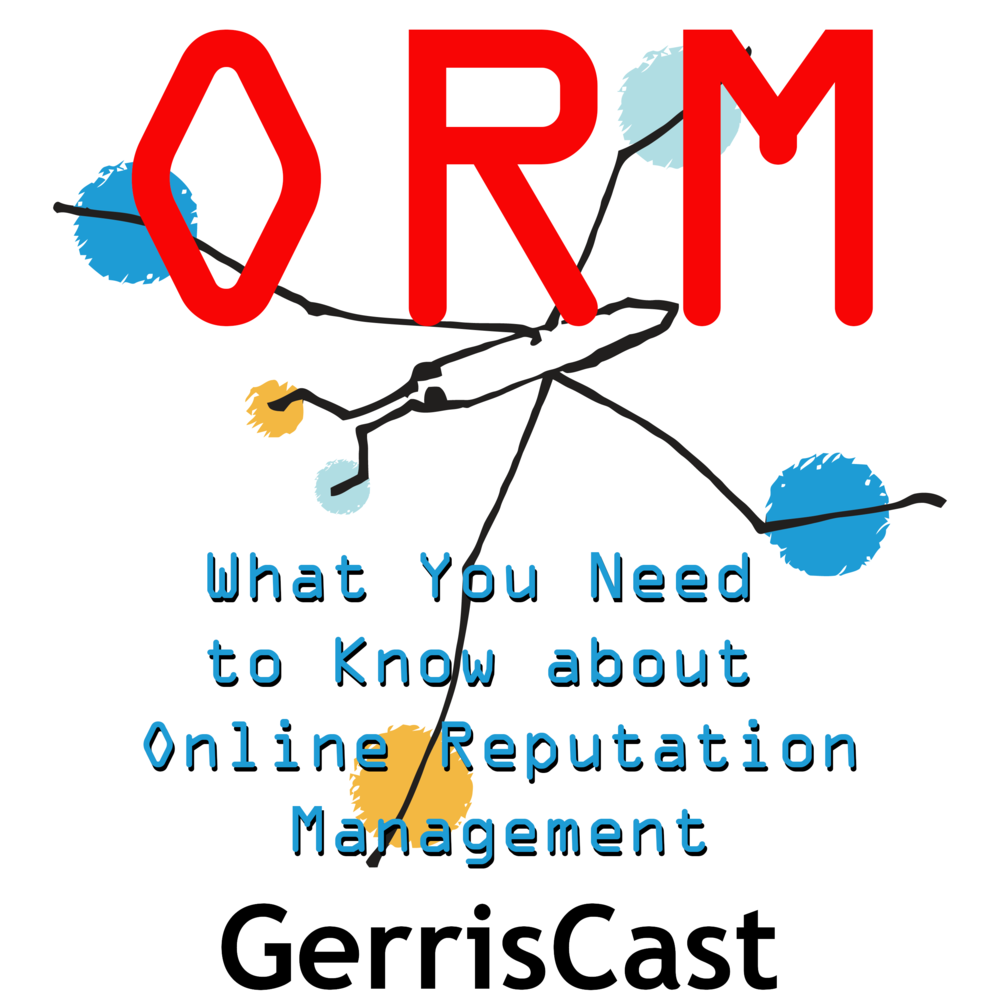GerrisCast Episode 3: What You Need to Know about Online Reputation Management (ORM)
| filed under: ORM, Search Results, Reputation, Online Reputation Management, Online Rep, Gerris Corp, Crisis Management, Gerris, Crisis Communication, SEO, GerrisCast, Search Mitigation, Google Search, Gerr.is, Reputation Management, Defensive SEO, Mitigating Negative SearchToday's episode is about online reputation management, often shortened to ORM, though I don't know if people call it ohhrmm.

Online Reputation Management (ORM) GerrisCast Podcast, Notes for Episode, 3 July 10, 2019:
-
Welcome to GerrisCast episode 3
-
Today's episode is about online reputation management, often shortened to ORM, though I don't know if people call it ORM.
-
-
What is online reputation management?
-
Online reputation management (ORM) is the practice of crafting strategies that shape or influence the public perception of an organization, individual or other entity on the Internet. It helps drive public opinion about a business and its products and services.
-
ORM is a variation of search engine optimization (SEO) on steroids requiring the ability to promote all the positive and neutral articles showing up on Google or Bing search—most of which are not owned or controlled by the client or agency—with the goal of bubbling the positive and neutral articles to the top two pages of Google, relegation the negative articles to page 3 or 4 of Google and Bing (Google is 100x more of a challenge than Bing, every time).
-
-
ORM Key Value Points
-
Stop the propagation of misinformation and confusion by pushing it onto results pages where 10 percent or fewer of searchers will ever see it.
-
Create content to ensure that the negative content already present is outweighed by positive content.
-
Place greater emphasis on positive achievements and accomplishments.
-
Create a long-term solution that will help to prevent any future unwelcome issues from surfacing.
-
Which search engines dominate the market?
-
Google leads the search engine market, with approximately 66% of U.S. searches. For this reason, our engagements target Google primarily. Microsoft Bing, which also powers Yahoo! Search, accounts for roughly 30% of the market. The other 4% is taken up largely by Ask and AOL. For the vast majority of cases, successful ORM engagements in Google lead to comparable success elsewhere.
What impact does social media have on reputation management?
-
Social media has a large impact on online reputation. According to recent data, approximately 18% of visitors to a business’s website are influenced by social media. We can help you develop strategies to specifically address this aspect of your online reputation.
-
How does it relate to perception management, traditional reputation management, crisis management, and strategic public relations?
-
How does it relate to search engine optimization (SEO?)
-
The expertise of SEO firms does not address the problems of online reputation management (ORM). While an SEO firm only needs to move sites that it controls up in the search results, Reputation.com has to move a large number of sites we don't control, both up and down. In order to achieve this goal, we've spent millions on R&D, developing and testing customized technologies and proprietary approaches. No other company in the world offers a competing product.
-
It would be incredibly inefficient to utilize standard SEO techniques to target each spot in the first page of results in the way ORM can. The expense would be 10 times that of a regular SEO engagement, and each of the sites in question would compete with the others, reducing their impact collectively. ORM is a much more nuanced approach that spreads promotional factors between many sites in order to build the right impression in the most cost-effective manner possible.
-
-
Who uses ORM?
-
High net worth individuals
-
Businesses
-
Brands
-
More and more, regular individuals.
-
Price depends a lot on how much global attention each particular case has, how old the problem is, whether there's anyone engaged in attack or subterfuge, and even how unique the names and "keywords" are
-
-
-
How do they use ORM?
-
How does ORM work?
-
Preventative ORM
-
Crisis ORM
-
Clean up ORM
-
-
ORM Methodology
-
Identify welcome and unwelcome content appearing in the search results under consideration, incorporating any feedback or suggestions provided.
-
Analyze the search results to identify the specific balance of factors that are contributing to the ranking of both welcome and unwelcome content.
-
Build a custom technological framework for the unique search profile discovered in the analysis stage.
-
Promote welcome items and demote unwelcome items using our proprietary and patented technology and methods.
-
Focus on creating new content to provide supplementary ranking strength to preexisting welcome materials.
-
Assess the effectiveness of the engagement and refine the technological framework as required, testing the level of support necessary to create the greatest likelihood of permanent positive change.
-
Build sufficient preventative strength in the search results to protect against new unwelcome content that might potentially be posted in the future.
-
-
How much does ORM cost?
-
Price depends a lot on how much global attention each particular case has, how old the problem is, whether there's anyone engaged in attack or subterfuge, and even how unique the names and "keywords" are.
-
-
ORM Timeline
-
ENGAGEMENT TIMELINE
-
Our typical engagement term is 12 months long, which is the minimum amount of time necessary to create lasting change in the search results. The following is a projected timeline based on the results of work on similar past engagements. This is an estimate only: given the nature of online reputation management activities, it is not possible to provide a precise timeline.
-
-
Preventative ORM
-
DIY ORM (what you can do yourself)
-
Thank you for listening to episode 3 of GerrisCast all about online reputation management.
Never forget to use the online HTML editor tools when it comes to composing or converting articles for the web.

